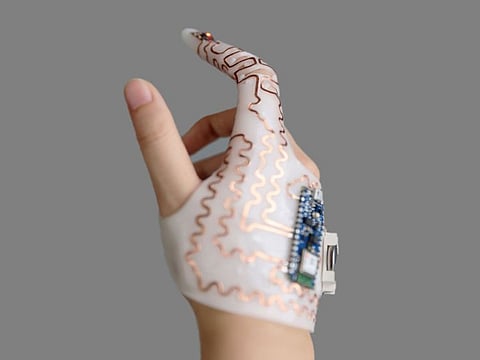Inaugural ‘Prototypes for Humanity’ event to showcase impact innovation projects in Dubai
The event showcases impact innovation projects developed by university students

Dubai: A new event titled ‘Prototypes for Humanity’, showcasing impact innovation projects developed by university students from across the world will debut in Dubai on November 16-17.
The event is being held under the patronage of Sheikha Latifa bint Mohammed bin Rashid Al Maktoum, Chairperson of Dubai Culture and Arts Authority (Dubai Culture) and member of the Dubai Council, Held in partnership with Dubai International Financial Centre (DIFC), the leading global financial centre in the Middle East, Africa, and South Asia region, and supported by Dubai Culture and A.R.M. Holding, ‘Prototypes for Humanity’ builds on the success of the Global Grad Show, an annual exhibition of innovative university design projects held since 2015.
The new event focuses on catalysing action and mobilising organisations whose infrastructure, reach, and technical know-how can be leveraged to accelerate the implementation of impact innovation projects. Impact innovation represents collaborative projects that harness emerging technologies to create a measurable impact in solving critical problems facing humanity.
Groundbreaking solutions for global problems
Engaging university talent across science, technology and creative disciplines from over 100 countries, ‘Prototypes for Humanity’ resonates with Dubai’s entrepreneurial spirit and the agenda for COP28, to be hosted by the UAE at the end of 2023. The inaugural event brings together trailblazing ideas, projects, and technologies, addressing critical challenges affecting humanity. With a wealth of expertise from cutting-edge academic projects, the event aims to raise awareness of global problems and shine the spotlight on solutions and actions that have the power to solve them.
Built around a gathering of exceptional academic talent, ‘Prototypes for Humanity’ celebrates ideas for positive social and environmental impact. The event launches as the most diverse assembly of impact-driven innovations, with a mission to catalyse change and reinforce the role of academia-led alliances in accelerating change. Tapping into the power of multi-stakeholder partnerships, the new event brings together academic, intellectual property, private and public sector and venture-building experts to build positive-sum impact solutions.
‘Prototypes for Humanity’ will introduce 100 IP-backed, best-in-class impact innovation projects by university students proposing solutions for a better world. The selected projects illustrate the numerous and often unknown ramifications of global challenges and demonstrate how diverse problem-solving perspectives are not only complementary but necessary.
International participation
The projects shortlisted for the event were chosen from applications from over 450 universities across over 100 countries, ranging from leading globally renowned institutions like Stanford University, Massachusetts Institute of Technology (MIT), University of Oxford, University of Cambridge, ETH Zurich, Tsinghua University, and National University of Singapore to rising universities in the Global South. The submissions included a record number of universities from 25 African nations, and large emerging economies such as India, Brazil, Indonesia, Mexico, and Turkey.
‘Prototypes for Humanity’ features unique projects from Oxford Medical School, MIT’s aerospace engineering programme and Harvard’s John F. Kennedy School of Government, apart from research hubs from the Global South, including the University of Ibadan in Nigeria, University of Mexico Centro, Bakrie University in Indonesia, Cadi Ayyad University in Morocco, and the State University of Azerbaijan. As part of the ‘Prototypes for Humanity Awards’, prizes worth $100,000 will be offered to the best projects in the fields of Environment, Health, Society, and Corporate Solutions.
This year’s event will include round-table meetings, debates, and workshops to map obstacles and outline incentives and explore mechanisms that can enable high-potential innovation to migrate from university labs to the real world. The initiative will also engage the venture capital community, as well as private and institutional investors, including A.R.M. Holding, who launched a $2.7 million fund in 2019 to support social impact innovations.
Partnership with DIFC
Commenting on the vision for the partnership, Arif Amiri, CEO of DIFC Authority, said: “We are a strong partner in making Prototypes for Humanity a reality, as we believe in the potential of academic research to initiate change.” During the exhibition, open to the public on November 16 and 17, the 100 innovation projects showcased at the event will highlight key areas of interest for international students including energy and emergency relief, food production and access to healthcare.
A new model for addressing challenges
Tadeu Baldani Caravieri, Director of ‘Prototypes for Humanity’, said: “When considering significant societal problems, like pollution or illiteracy, we see how they are systemic issues, but with very tangible manifestation all around us. By looking at the solutions proposed by researchers from around the world, we can imagine a model that addresses these challenges in the reverse order, from the micro to the macro. Academia can clearly resolve most of the technical, concrete facets of pollution and illiteracy, for example. What we want to investigate through the ‘Prototypes for Humanity’ programme is how to mobilise a consortium of organisations that can on-board these innovations and tackle these problems at a macro level, on a global scale, together.”
This year’s applications reflect a shift in thinking about impact: from innovation for an uncertain future to urgent, more concrete, and quickly-deployable solutions anchored in viability. Furthermore, the entries demonstrate that academic research is not happening in a vacuum but rather within a context of collaboration and opportunity, with clear influences from the start-up culture that makes university projects noticeably grounded in the real world. Additionally, concepts directed at off-grid and self-reliant living illustrate a desire to explore alternate solutions beyond the norm.
A comprehensive list of this year’s 100 shortlisted entries will be live on November 14 on www.prototypesforhumanity.com.


